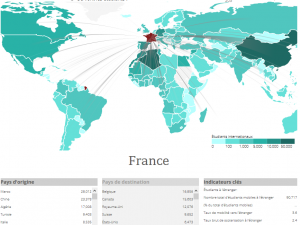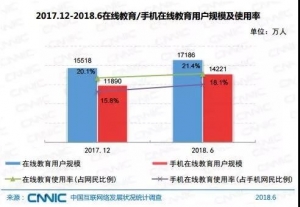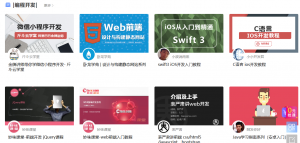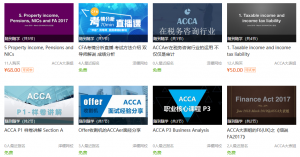
Online schools: a new opportunity for the French educational sector
The rapid growth of China’s e-commerce had lead many enterprises to realize that digitalizing their activities was a step not to be missed.
Besides, the population itself also has a new attitude towards studies. To continue to train in languages as well as in other subjects has become a real guarantee of social valorization. A Chinese online course platform’s slogan gives a clear example of this growing tendency: “study and become a better person!” (« 学习,成为更好的自己 »).
The Chinese educational sector is much more than just pedagogy: it is a real business where money is not a taboo. “Online schools” (在线学校) also named as “digital education” (在线教育) are not a new phenomenon but were not well-known and the concept very little exploited until today.
This boom of online schools is an opportunity in terms of communication for French educational structures wishing to attract Chinese students. Moreover, the latest forms a contingent among foreign students in France, since they represent the country’s second largest student flow (UNESCO, 2015) after Morocco with a total of 28,760 Chinese students in France over the period 2016-2017 (Campus France, 2018).

Provenance of all foreign students in France, according to UNESCO 2015 statistics.
The beginning of the digital age and the creation of new educational opportunities in China
With the rise of digital solutions, other phenomenon had also lead to the development of online schools. The progressive opening of China to the West has resulted in a strong demand of qualified people, especially the one mastering foreign languages such as English. In the same way, the rapid growth of the Chinese economy has allowed a large number of persons to access specialized training. Thus, many “online” and “offline schools” were created. Offline language schools are mainly chosen for the learning of children; whereas teenagers, students and working people prefer to use online bespoke language courses.
Specialized trainings are also developing thanks to digital solutions. Indeed, courses in engineering, mathematics, commerce and other subjects are available online. Those are often a complement to university courses and give students opportunities to learn through another type of teaching, deepen some particular points or review parts that were not well understood. Thanks to the variety of courses that are offered, online courses have grown even more rapidly. According to the CNNIC (China Internet Network Information Center), there are now more than 171 million users of e-learning solutions in China and 83% of them are learning via their mobile phones (142 million). In addition, a large majority of those people belong to the age group that is the most in search of mobility, namely the 18-27 year old.

Total amount of users choosing e-learning solutions (blue), including users choosing to learn via their mobile phones rather than other internet devices (red). Evolution between December 2017 and June 2018 according to CNNIC statistics.
An alternative to the Western Massive Open Online Courses (MOOC)
The Chinese learning system soon knew how to differentiate the idea of “remote course” and “online course”. Unlike the first one, which does not always mean that students are closely monitored by a teacher, the second one plays the advantage of proximity and flexibility. Several types of courses have emerged in the last six years:
-
Courses given via an instant messaging application (WeChat)
Meisi Consulting (美思教育) is a pioneering company in the large-scale marketing of this service. As indicated in its slogan, it proposes courses and a personalized follow-up through WeChat, which allows “clients” to learn “anytime, anywhere”. The use of this famous Chinese application also allows users with urgent demands to easily reach their professors or the teaching team. A major feature of this type of online school is that it cannot be found by internet search engines as it does not own a website, but is widely present on WeChat and known by its users.
-
Courses displayed on intermediary platforms (Fun MOOC type)
Platforms such as CCtalk (Hujiang 沪江) or Tongxun Ketang (Tencent通讯) permit the creation of a banner and provide free solutions of live streaming. Furthermore, they offer numerous tools so that schools or individuals can promote their activities and give courses freely. Those courses can be free or not (the cost of the latest often being ridiculously low). This type of platform offers a real-life learning experience, allows a large number of people to learn via their mobile phones and permits an unprecedented advertising for private schools and universities. Thanks to all those features, the success was tremendous.

Choices of online computer courses on the CCtalk platform.

Choices of online finance courses on the Tongxun Ketang platform.
-
Platforms developed and managed by schools themselves
This alternative is rather similar to the intermediary platforms’ one. The difference is that they are only dedicated to one school. Often, those platforms belong to large specialized structures proposing a variety of educational paid services. Moreover, for a school to broadcast classes via its own platform is not incompatible with the promoting of its activity on an intermediary one.
A way to be known, to better accompany and welcome Chinese students wishing to study in France
Despite the generalization of digital technologies, being able to experience abroad studies remains a major factor for professional and social growth in China. As a Chinese student living in France since 2011 has testified: “it is true that to be successful in China, one needs to go abroad and be the best”. This comment explains why many Chinese students go to France every year and in other countries to continue their studies. However, the lack of information about international schools, of partnerships with foreign structures and the fear of the unknown are often synonyms of hardships and discouragement for them.
It is essential for an educational structure interested to develop internationally to be known and give itself the opportunity to establish partnerships in China. Being able to answer to Chinese students questions is also a key factor. To do so, an in-depth knowledge about the Chinese educational market trends, an understanding of the students’ expectations and the possibility to communicate in their native language are essential features.
You are a school and would like to know more about the educational market in China? Don’t hesitate to contact us at info@shuo-digital.com